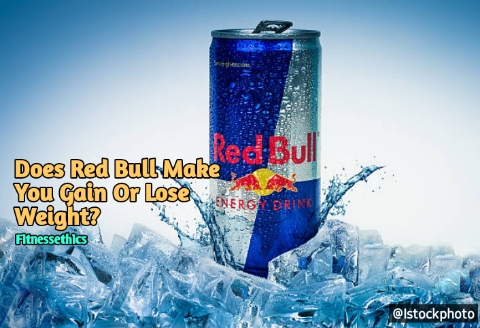In the fast-paced world we live in today, energy drinks have become a popular choice for many people who need a quick boost of energy to keep up with their demanding lifestyles. Among these energy drinks, Red Bull has emerged as one of the leading brands, known for its stimulating effects. However, concerns about weight gain and its potential negative impact on health have raised questions about the effects of Red Bull on weight management. In this article, we will explore the topic in depth and shed light on the relationship between Red Bull consumption and weight.
Does Red Bull Make You Gain Weight?
Yes, consuming Red Bull can contribute to weight gain, particularly if you consume it frequently and in large quantities. Weight gain occurs when you consume more calories from food and drinks than your body requires. The amount you eat and drink plays a significant role in determining whether you gain weight or not. Enjoying an occasional can of Red Bull won’t lead to weight gain, but if you find yourself drinking several Red Bulls every day for an extended period, you are likely to put on some extra pounds. Additionally, if you have a sedentary lifestyle and don’t engage in much physical activity, weight gain can occur even more rapidly.
One of the reasons Red Bull can contribute to weight gain is its high sugar content, similar to that of Coca Cola. The sweetness and pleasant taste of Red Bull make it tempting to consume more. Since it is enjoyable to drink, we may find ourselves reaching for additional cans without realizing the impact on our calorie intake. Therefore, it’s important to be mindful of the sugar content in Red Bull and consider healthier alternatives if weight management is a concern.
Red Bull, like many energy drinks, contains calories primarily derived from sugar and caffeine. A regular 8.4 fl oz can of Red Bull contains approximately 110 calories, with 27 grams of sugar. Consuming excess calories without burning them off through physical activity can lead to weight gain over time. If you regularly consume Red Bull as part of your daily routine and do not compensate for the additional calories consumed, it could contribute to weight gain.
Furthermore, Red Bull may indirectly influence weight gain by affecting appetite. Some studies suggest that the high sugar and caffeine content in energy drinks can stimulate hunger and increase food intake, leading to overeating and potential weight gain. It’s important to note that these effects may vary among individuals, as factors such as metabolism, activity level, and overall diet can influence weight management.
Does Sugar-Free Red Bull Make You Gain Weight?
Sugar-free Red Bull is a popular alternative for those seeking to reduce their sugar intake while still enjoying the energizing effects of the beverage. Sugar-free variants typically use artificial sweeteners such as aspartame or sucralose to provide sweetness without the added calories. As a result, sugar-free Red Bull contains significantly fewer calories compared to the regular version.
While sugar-free Red Bull may be lower in calories, it is important to be mindful of the potential effects of artificial sweeteners on weight management. Some studies have suggested that artificial sweeteners can disrupt the body’s natural ability to regulate calorie intake, potentially leading to overeating and weight gain. However, more research is needed to fully understand the impact of artificial sweeteners on weight.
Does Red Bull Make You Bloated?
Bloating, characterized by a feeling of fullness and discomfort in the abdomen, is a common concern for many individuals. While some people may experience bloating after consuming Red Bull or other carbonated beverages, it is not necessarily a direct result of Red Bull itself.
Carbonated drinks, including Red Bull, contain carbon dioxide gas that can be released in the stomach, leading to a feeling of bloating. Additionally, the high caffeine content in Red Bull can act as a diuretic, potentially increasing urine production and causing dehydration, which may contribute to feelings of bloating.
It’s important to note that individual sensitivities to carbonation and caffeine can vary. Some people may be more prone to experiencing bloating after consuming Red Bull, while others may not notice any significant effects.
Conclusion
The relationship between Red Bull consumption and weight management is complex and multifactorial. While Red Bull does contain calories and consuming excessive amounts without compensating for them can contribute to weight gain, it’s important to consider other factors such as overall diet, physical activity, and individual differences in metabolism.
Opting for sugar-free Red Bull can reduce calorie intake, but potential effects of artificial sweeteners on weight management should be considered. Bloating may occur for some individuals after consuming Red Bull due to carbonation and caffeine, but it varies among individuals.
As with any food or beverage, moderation is key. If you enjoy Red Bull, it’s important to incorporate it into a balanced diet and consider the overall impact of your lifestyle choices on weight management. You should always consult a healthcare professional if you feel discomfort or certain developments about your body.
[starbox]


